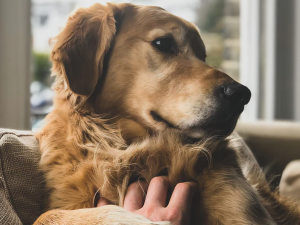It is not difficult to break a heart – especially when it comes to the realm of pets. For many an animal lover, there is an intense yet simple joy in being greeted in the morning by a wagging tail noisily bumping against a piece of furniture, or the feeling of whiskers brushing against one’s face. So it is that, when the painful time comes to say farewell to our pets, a gash is left in the heart that may take years to heal.
Everybody grieves differently. There is no point in trying to nail down a formula or normalise how an individual processes the passing of a family member, whether the y be human or animal – and pets can certainly leave such a human-sized void in our lives when they depart.
y be human or animal – and pets can certainly leave such a human-sized void in our lives when they depart.
Kaleel Sakakeeny, an ordained animal chaplain and prominent pet loss counsellor, told Psychology Today magazine that “the relationship between us and our animal companions is less complicated and complex than that between us and another person. We seldom argue with our pet. We almost never resent them. We have few, if any, conditions on the love we and our pets share… Our human relationships are rarely that simple, rich and pure… When a person dies, there are often mountains of regret: things we wish we had said, things we wish we hadn’t said, betrayals for which we are sorry. The grief and mourning that follows can be complex and complicated. This is almost never the case when our beloved pet passes.”
Those who bestow the title of family upon their pets also stand to benefit from a wealth of mental and physical health benefits, including boosted self-esteem, faster recovery from illness or injury, and a greater tendency toward empathy. The very use of familiar language also imprints upon pets socially-supportive attributes that psychologically translate into social support – that is, if a person simply believes that their pet is considerate of the emotional needs, then they are likely to have at least a part of their needs socially supported.
 Even though many people obviously benefit from viewing pets as part of the family, we remain in a grief-avoidant society that often sees pet funerals and grieving as a self-indulgent activity – something that our not-so distant relatives would certainly frown upon. Just look at the Victorians, with their memento mori jewellery and black mourning garb. Nowadays, time spent grieving a pet’s passing might be met with little more than “it was just a cat” or “why don’t you get another dog?”. Somehow, society allows these animals to go from family members to “just a dog” when faced with the uncomfortable notion of mortality versus the perceived importance of pushing through the grieving process as quickly as possible – something that we would never force upon a personal for the loss of a brother, sister, mother or father. On the other hand, the pain felt when losing a pet is almost universally acknowledged; so it is that the gravity of pet loss is gaining traction. Some businesses are open to grievance leave when a pet passes away.
Even though many people obviously benefit from viewing pets as part of the family, we remain in a grief-avoidant society that often sees pet funerals and grieving as a self-indulgent activity – something that our not-so distant relatives would certainly frown upon. Just look at the Victorians, with their memento mori jewellery and black mourning garb. Nowadays, time spent grieving a pet’s passing might be met with little more than “it was just a cat” or “why don’t you get another dog?”. Somehow, society allows these animals to go from family members to “just a dog” when faced with the uncomfortable notion of mortality versus the perceived importance of pushing through the grieving process as quickly as possible – something that we would never force upon a personal for the loss of a brother, sister, mother or father. On the other hand, the pain felt when losing a pet is almost universally acknowledged; so it is that the gravity of pet loss is gaining traction. Some businesses are open to grievance leave when a pet passes away.
We have a long way to go to fully accepting the grieving process of pet loss. While we’ve managed to do what we can – whether it’s carry our pet’s ashes in a special locket or tattoo their paw prints on our skin – acknowledging our grief on a level reserved for humans still seems just that. At Pets in Peace, we believe we will break down those barriers one day.
[text-blocks id=”72″ slug=”blue-bottom-bar”]